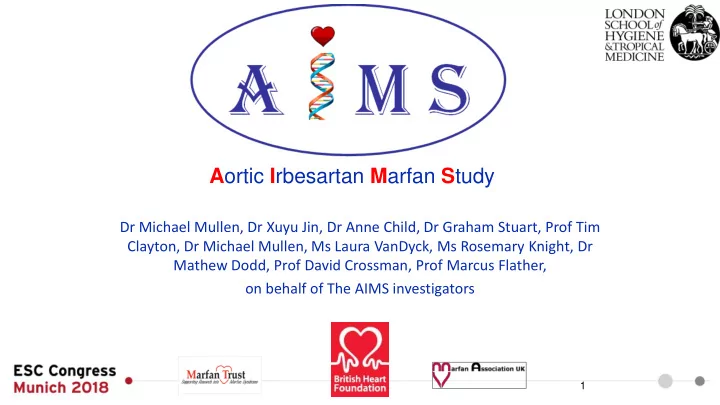

A ortic I rbesartan M arfan S tudy Dr Michael Mullen, Dr Xuyu Jin, Dr Anne Child, Dr Graham Stuart, Prof Tim Clayton, Dr Michael Mullen, Ms Laura VanDyck, Ms Rosemary Knight, Dr Mathew Dodd, Prof David Crossman, Prof Marcus Flather, on behalf of The AIMS investigators 1
Conclusions • In patients with Marfan syndrome Irbesartan at standard doses is associated with significant reduction in the rate of aortic root dilatation • Although normotensive at baseline the treatment results in a modest reduction in systolic blood pressure but is well tolerated in both children and adults • If translated into clinical practice long-term Irbesartan treatment may impact favourably on clinical outcomes in patients with Marfan Syndrome
Background • Marfan syndrome a common inherited connective tissue disorder due to mutations in fibrillin 1 • Results in skeletal, cardiac and eye abnormalities • Aortic aneurysm and dissection may result in premature death • Experimental evidence indicates potential role for angiotensin receptor inhibition in retarding aortic dilatation mediated through reduced TGF- β activity
Purpose and key points about methods • A prospective, randomised, placebo-controlled double blind, multi-centre study of the effects of Irbesartan on aortic dilatation in Marfan syndrome • Key inclusion/exclusion criteria – Patients with Marfan Syndrome aged 6-40 years – No previous or planned cardiac surgery • Randomised to Irbesartan 150/300 mg OD (depending on age) in addition to standard medical therapy • Aortic dilatation measured at core laboratory by annual echocardiogram for up to 5 years • Primary outcome: Absolute change in aortic root diameter per year
Results • 192 patients recruited • 88 randomized to placebo 104 to Irbesartan • Significant reduction in rate of change of aortic root diameter compared to placebo 0.74 vs 0.53 mm/year Difference -0.22 (95%CI -0.41 - -0.02); p= 0.03 • Significant reduction in rate of change or aortic root Z-score and systolic blood pressure • Irbesartan well tolerated with no differences in SAEs between groups • No difference in clinical outcomes including surgery • No deaths in either group
Key messages • This study supports the use of Irbesartan to reduce the rate of aortic dilatation in patients with Marfan Syndrome • Irbesartan is safe and well tolerated even in children • Further research will help to establish impact on clinical outcomes
Recommend
More recommend